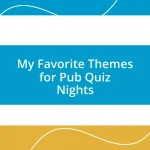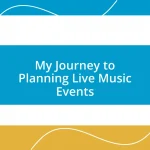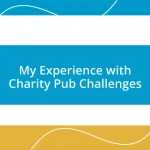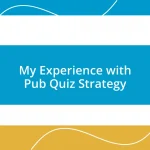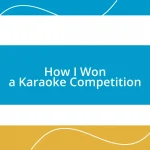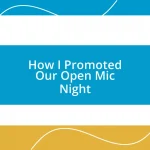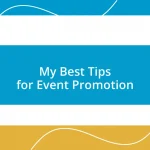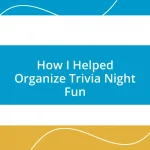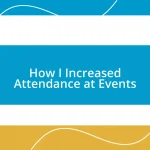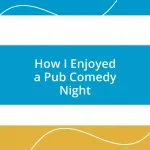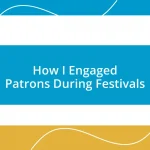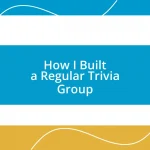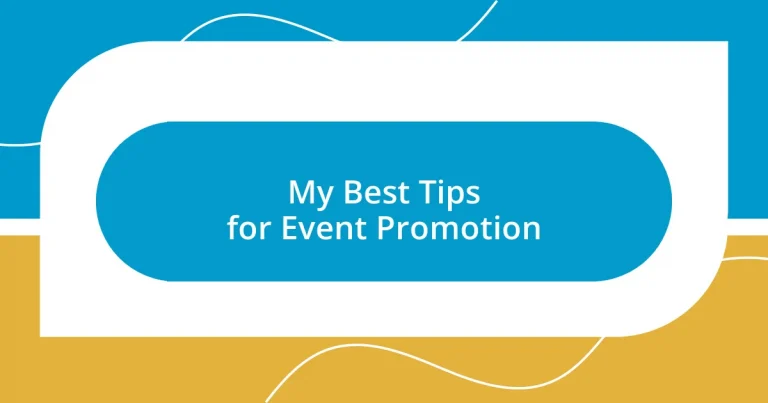Key takeaways:
- Understanding your target audience’s motivations and preferences enhances engagement and promotes emotional connections, leading to higher attendance.
- Crafting a compelling event message that includes emotional storytelling, urgency, and tailored language invites people into a relatable narrative.
- Tracking promotion results and gathering feedback allows for continuous optimization of event strategies, improving future event planning and attendee experience.
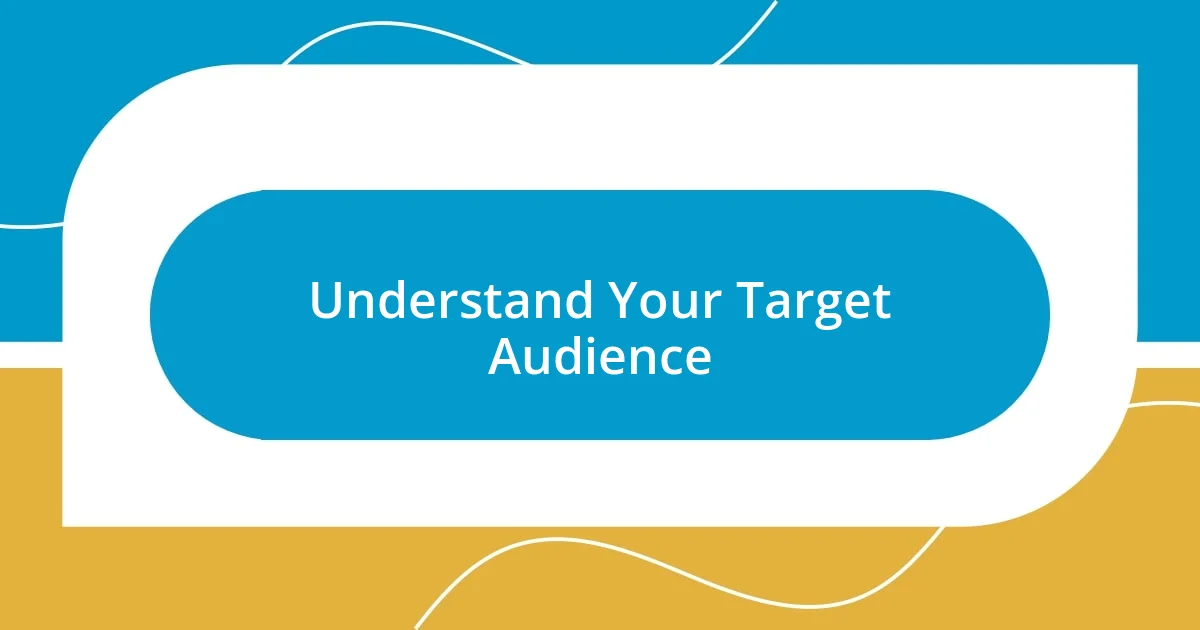
Understand Your Target Audience
Understanding your target audience is absolutely crucial for effective event promotion. In my experience, I’ve often found that getting to know your audience deeply—beyond mere demographics—leads to more meaningful engagement. For instance, when I organized a community art fair, I spent time talking to local artists and attendees to uncover their preferences and motivations. I learned that they craved not just art but also connection and inspiration.
Have you ever thought about what really drives your audience’s passion? This insight can transform your approach. When I tailored the promotional materials to highlight the stories behind the artists, attendance jumped—the audience felt an emotional connection and was eager to be part of that narrative. It’s those emotional touchpoints that resonate and help create a sense of belonging around your event.
Lastly, consider the different segments within your audience. Not everyone is looking for the same experience. During another event I managed, I discovered that younger attendees prioritized social media engagement, while older ones appreciated in-depth discussions and workshops. By catering to these preferences, I was able to enhance the experience for all. It’s a reminder that understanding your target audience isn’t just about knowing who they are; it’s about grasping what experiences they value.
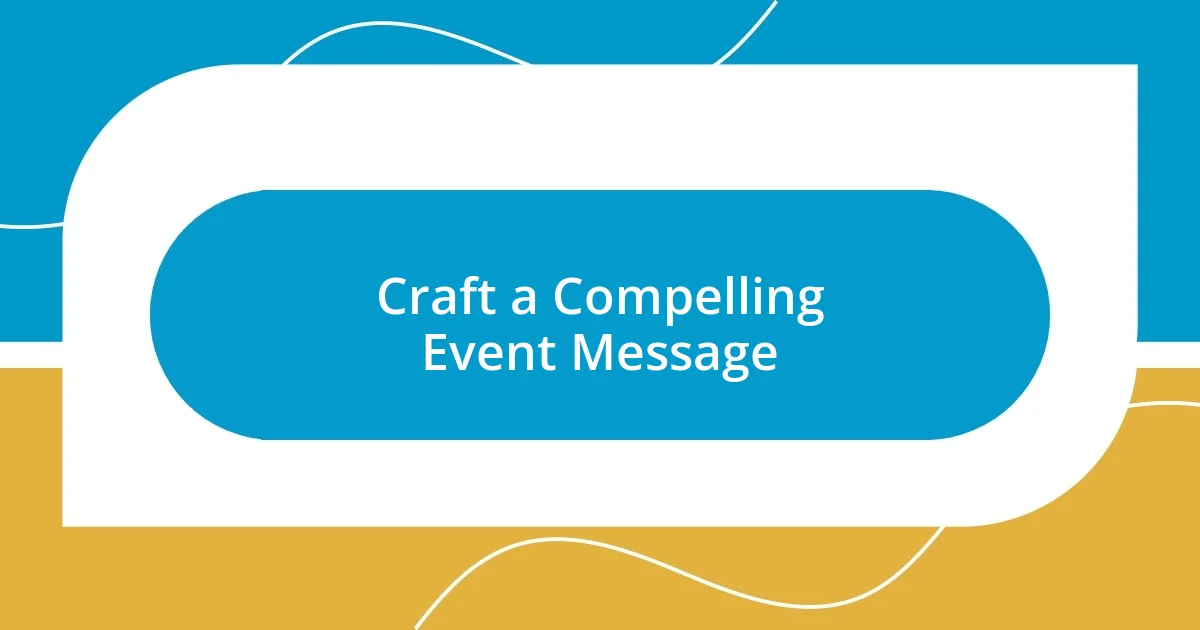
Craft a Compelling Event Message
Crafting a compelling event message requires clarity and emotion. When I was promoting a charity gala, I realized that simply listing the event details wasn’t enough. I focused on the cause itself—the lives we could change—and shared heartfelt stories of individuals who benefited from our efforts. This personal touch made the message much more relatable and drew attendees who were motivated by a sense of community and purpose.
To create your own compelling event message, consider the following:
- Connect emotionally: Share personal stories or testimonials that highlight the impact of your event.
- Highlight key benefits: Clearly outline what attendees will gain—knowledge, connections, or experiences.
- Use engaging visuals: Photos or videos can help convey the atmosphere and excitement of the event.
- Create urgency: Incorporate deadlines or limited availability to encourage immediate action.
- Tailor your language: Use words and phrases that resonate with your specific audience, making them feel included and valued.
Ultimately, it’s about more than just sharing information; it’s about inviting people into a narrative that compels them to join in.
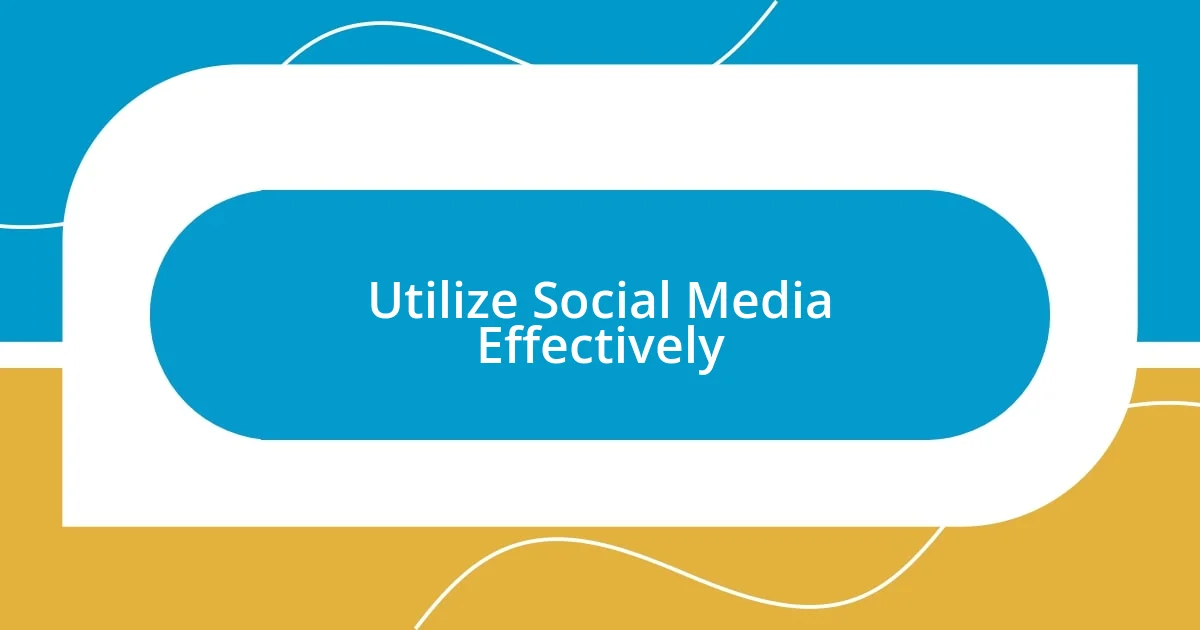
Utilize Social Media Effectively
When I think about using social media effectively, I can’t help but recall an event I promoted on Instagram. By creating a dedicated event page and sharing visually appealing content, I captured attention much faster than through traditional methods. It made me appreciate how vital high-quality visuals and engaging captions are in drawing an audience’s interest. Do you remember the last time a photo stopped you from scrolling? That’s the impact I aim for.
Engagement is key in social media promotion. I remember interacting with potential attendees through comments and direct messages while promoting a festival. It transformed my approach from a one-sided broadcast to a two-way conversation, making people feel invested in the event. Moreover, when I asked followers about their favorite festival experiences in those interactions, it sparked discussions that naturally drew in more attention. Social media is a powerful tool for building community around your event, so don’t hesitate to cultivate those relationships.
Lastly, scheduling regular posts leading up to your event is critical. When I promoted a recent outdoor concert, I put together a content calendar that included sneak peeks and countdowns. Each post served as a reminder while building excitement, creating a buzz that I could literally feel in the air as the event day approached. Using social media analytics helped me understand what my audience resonated with, guiding my future posts. Have you thought about how timing and consistency can amplify your reach? It’s all about creating a rhythm that keeps your event front of mind.
| Social Media Strategy | Effective Tips |
|---|---|
| Create Visual Content | Use high-quality images and engaging videos. |
| Engage with Your Audience | Respond to comments and ask for their input. |
| Regular Posting Schedule | Use a content calendar to maintain visibility. |
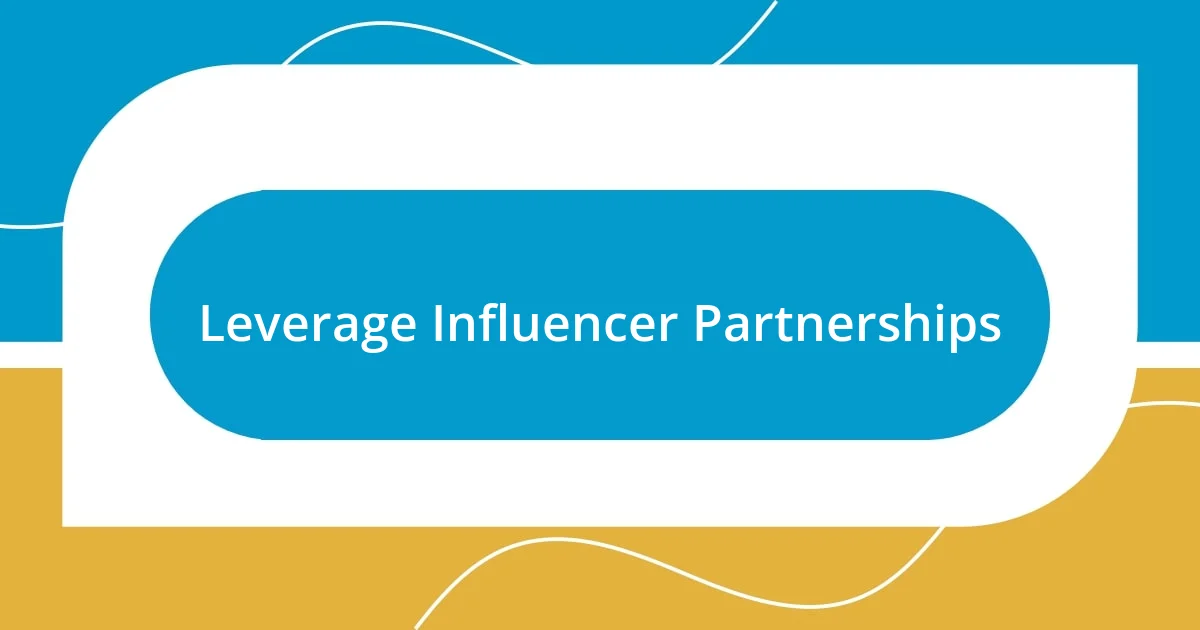
Leverage Influencer Partnerships
When I began to think about leveraging influencer partnerships for an event, I recalled the time I collaborated with a popular local influencer for a networking event. Their endorsement instantly broadened our audience reach. It made me realize the power of social proof—people are naturally inclined to trust recommendations from someone they admire. Have you ever noticed how much more likely you are to attend an event if an influencer you follow promotes it? That’s the kind of effect I aim for when partnering with influencers.
In my experience, the authenticity of the influencer’s message can significantly impact the event’s success. For instance, when I worked with an influencer who genuinely believed in our cause, their followers responded enthusiastically. They shared personal testimonials about the event, which amplified our outreach. It was a win-win situation—while the influencer gained content for their brand, we drew in attendees who were passionate about our mission.
It’s also essential to choose the right influencers who align closely with your event’s values and target audience. One time, I partnered with an influencer who, although popular, didn’t resonate with our audience. It taught me that relevance trumps reach. When I finally connected with a local figure who shared our ethos, it felt like the perfect match. The connection led to more meaningful interactions and a genuine buzz around the event. Have you ever considered how the right partnership can transform your event promotion? The right fit can elevate your event from just another gathering to something your audience truly cares about.
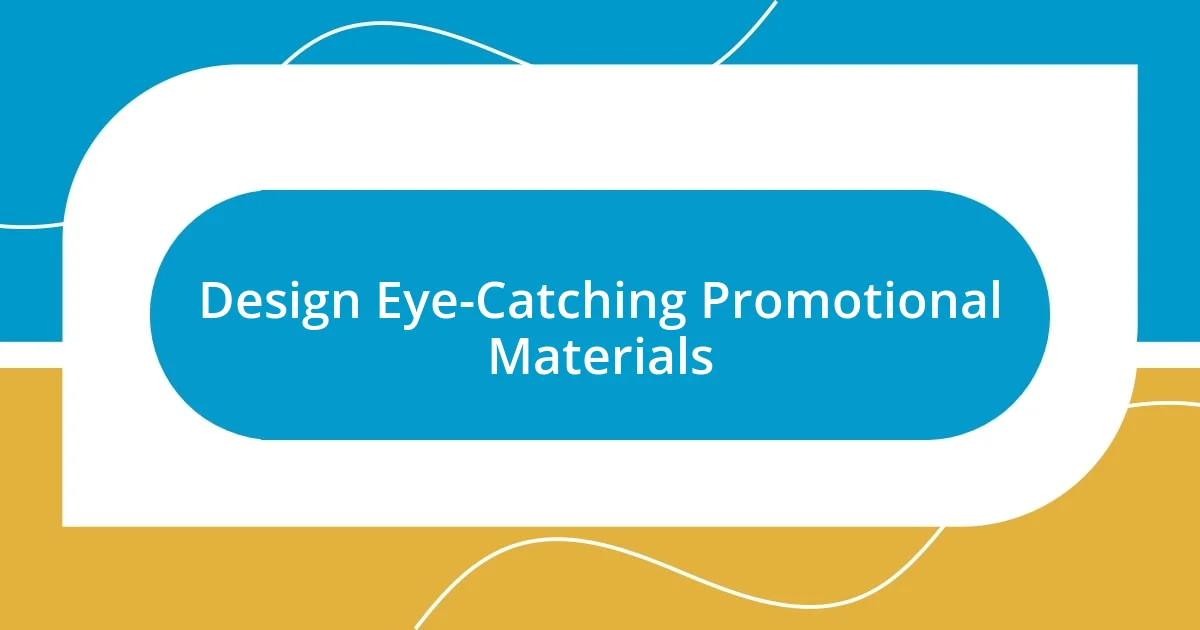
Design Eye-Catching Promotional Materials
Creating eye-catching promotional materials can truly make or break an event. I remember designing a flyer for a community art fair and realizing how essential the right visuals were. I chose vibrant colors and bold fonts to convey the festive spirit we aimed for, and it caught the eyes of passersby like a beacon. Have you ever noticed how your eyes are drawn to something that just “pops” out? That’s the kind of response I strive for when crafting promotional content.
In my experience, balance is key. Whether it’s a poster, a social media graphic, or an event program, it’s crucial to blend creativity with clarity. I once created an event banner that was visually stunning but cluttered with text. Instead of grabbing attention, it confused potential attendees. Lesson learned! Now, I always aim for a clean layout that communicates essential information at a glance, because isn’t it frustrating to squint at a poster trying to figure out the details?
Don’t underestimate the power of consistency in branding. When I promoted a charity run, I developed a cohesive look across all materials—think colors, logos, and fonts. This not only built recognition, but it also fostered a sense of trust and professionalism that resonated with participants. Think about it: If you saw mismatched visuals for an event, would it inspire you to attend? A consistent design strengthens your message and makes your event unforgettable.
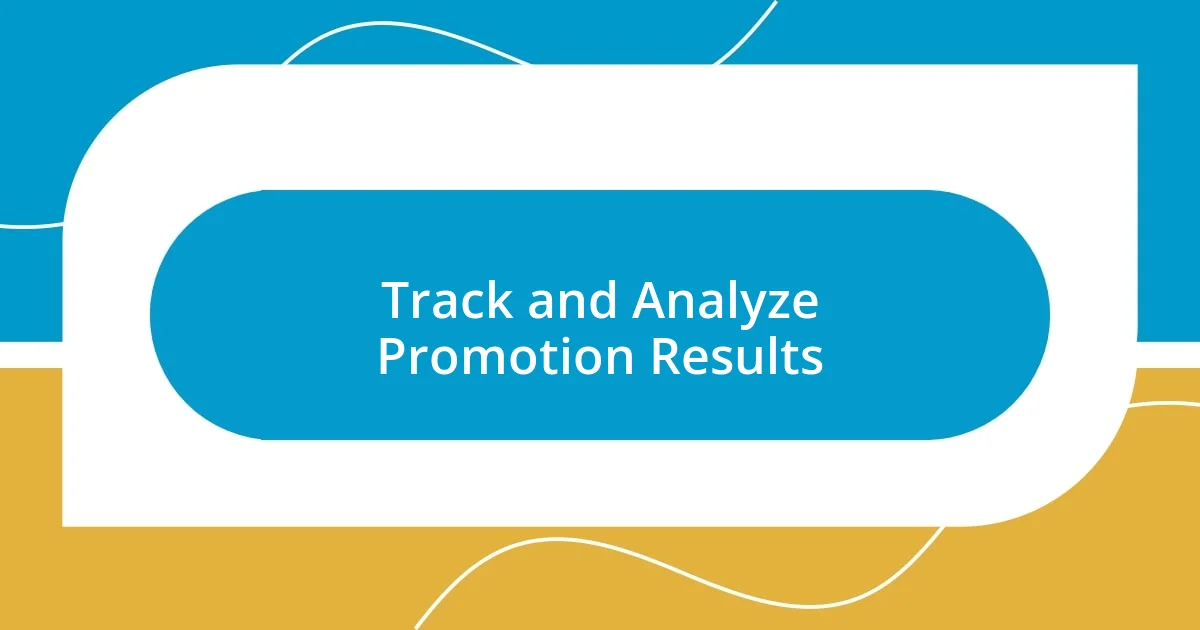
Track and Analyze Promotion Results
Tracking and analyzing promotion results is a vital step in refining your event strategy. I vividly recall a time when I tracked the response rates to various promotional channels for a fundraising gala I organized. By digging into the data, I realized that our social media ads outperformed email blasts, and that insight was a game-changer. Have you ever felt overwhelmed by the numbers but discovered hidden gems that led to significant improvements? That’s where the real magic happens.
Each event provides a unique opportunity to learn what works and what doesn’t. I remember meticulously logging ticket sales alongside social media engagement metrics after a local music festival. It was eye-opening to see that certain posts generated spikes in ticket sales, illuminating my path for future campaigns. It’s incredible how just a few adjustments based on data can lead to stronger results, don’t you think?
Using tools like Google Analytics or social media insights can help shape your decisions. After my last workshop, I explored audience engagement metrics and found out what times my audience was most active. This allowed me to schedule my promotions more strategically. Have you tried employing analytics to guide your promotional tactics? It transformed my approach, giving me confidence in my decisions and enhancing my connection with the audience.
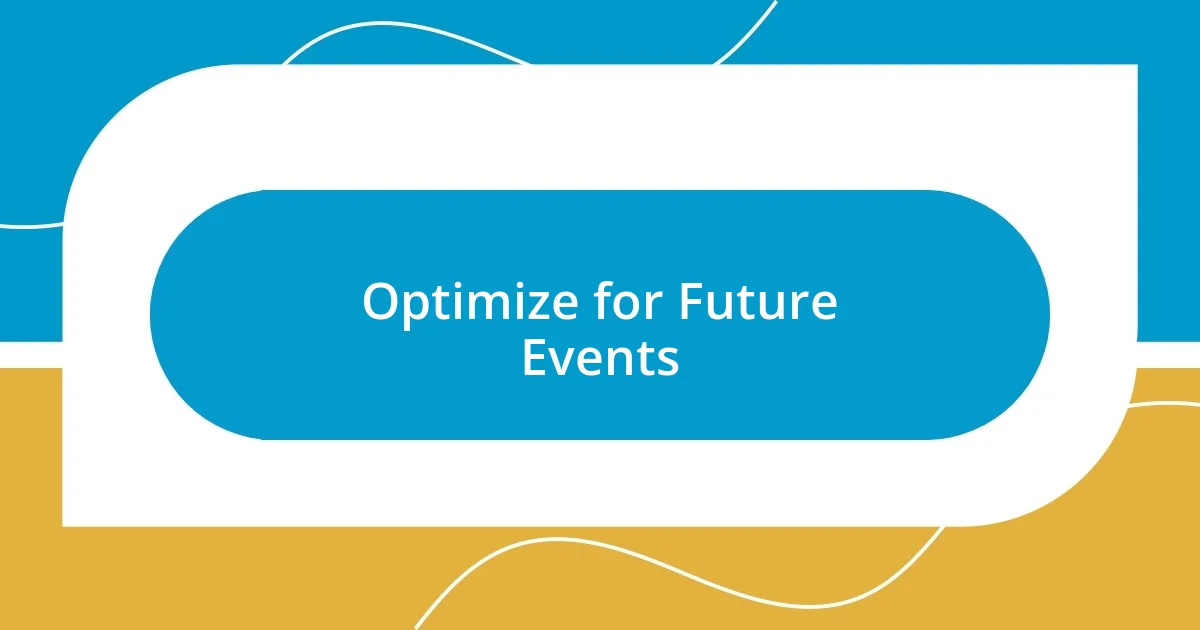
Optimize for Future Events
Optimizing for future events often starts with reflecting on what worked and what didn’t. I recall a small networking event I organized where we had an overwhelming response; it was amazing! But, upon review, I found that our scheduling, promoting heavily on a Tuesday, possibly excluded some potential attendees. The next time, I tried rotating the event days, and it opened up new avenues of participation. Have you ever noticed how timing can influence turnout? It’s fascinating how small tweaks can lead to big results.
Another essential component is gathering feedback from your attendees. After a digital marketing workshop I held, I sent out a quick survey asking participants about their experience. To my delight, the feedback highlighted aspects I hadn’t even considered, such as the need for more interactive sessions. I realized that listening to your audience not only helps in crafting better events but also fosters a sense of community. Isn’t it powerful to feel like you’re truly catering to the needs of those attending?
Lastly, I urge you to maintain a flexible mindset when planning future events. Adapting to changes or unexpected circumstances can be incredibly beneficial. I once faced a sudden venue change just a week before a large seminar, which seemed daunting at first. However, I used the opportunity to rethink the layout and enhance the experience based on the new space. Embracing these moments can lead to creative solutions and fresher perspectives—don’t you find that challenges can often spark the best ideas?
